If you are running an e-commerce business in 2024, using AI tools to address your unique challenges is essential. From inventory management to order processing and logistics, the complexities of operating in a global market demand multifaceted solutions. Some of these solutions require AI tools that can efficiently analyze vast amounts of data, predict trends, and automate tasks to streamline your operations. Finding the best AI tools for eCommerce is not as easy as it seems.
Plus, your competitors are continuously improving at managing their processes by using AI tools for e-commerce, and you should, too.
Whether it is a big, medium, or small-sized business, automating tasks like customer support, order tracking, and marketing will save you significant time and resources.
Let’s jump right in and explore some of the benefits of using AI in e-commerce.
What are the benefits of using AI in eCommerce?

Generated with ContentGo AI
Imagine manually tracking orders and updating product listings. You would quickly become overwhelmed and susceptible to errors. Even with a small shop, providing quick and accurate service is nearly impossible without the help of AI tools for e-commerce.
However, the necessity of the best AI tools for e-commerce depends on your business strategy. Depending on your business’s size and complexity, you may need various tools to streamline your processes effectively. Larger companies might require more sophisticated AI solutions to manage their operations efficiently, while smaller businesses might benefit from a more targeted approach.
For instance, a small shop may find immense value in using AI for customer service automation, inventory management, and personalized marketing. These tools can significantly enhance efficiency and customer satisfaction without overwhelming resources.
On the other hand, a larger eCommerce business might leverage a suite of AI tools for comprehensive data analytics, dynamic pricing, supply chain optimization, and advanced fraud detection. These tools can handle the scale and complexity of large operations, providing insights and automation that drive growth and profitability.
Despite the different strategic approaches to using AI tools, they all have similar benefits to businesses of all sizes. AI tools;
- Can automate repetitive and time-consuming tasks.
- Reduce human error and ensure more accurate data management, order processing, and customer interactions.
- Analyze customer data to provide personalized recommendations and targeted marketing.
- Can process vast amounts of data to generate actionable insights.
- Allow businesses to allocate resources more efficiently and increase profitability.
- Handle increased workloads and complexities as your business grows.
- Provide deep insights into customer behavior, preferences, and trends.
There are numerous benefits to using AI tools for eCommerce. The key is to determine which tools will best meet your needs. You probably already know which processes in your business need to be streamlined. You can pinpoint the tools that will offer the greatest benefit by identifying the tasks that will have the most significant impact when automated or optimized. Remember, you don’t need AI tools for every process, and avoiding relying on them excessively is essential. Always maintain control and exercise caution to ensure you leverage AI effectively and responsibly.
How to implement AI tools in your online store?
The first step is to understand your business thoroughly. Which operations are not as smooth as you’d like? If you have a small business, you likely personally manage most aspects of the operation, such as customer service, inventory tracking, and order fulfillment. However, you could use an extra hand in marketing since small businesses usually operate with tighter budgets and fewer staff.
But suppose you work for a large retail company. In that case, you know that supply chain management, customer service, pricing, and data analytics are crucial areas where efficiency and precision are needed the most. Managing these complex operations manually or with a limited team is not feasible. AI tools can process vast amounts of data, provide real-time insights, and automate repetitive tasks, allowing your business to scale effectively and remain competitive.
After determining the areas you need to improve, look for tools on the market. Consider features, ease of use, cost, and customer support. Remember that your goal is to optimize efficiency and enhance your operations without incurring excessive costs. Aim to find cost-effective solutions that offer the best value for your investment. Reading reviews and case studies to understand how these tools have benefited other businesses is always a good practice.
Now, you have a couple of tools you would love to implement in your store and want to use. Many AI tools offer APIs that allow you to integrate their functionality directly into your existing systems. However, implementing this requires some technical knowledge or a developer.
If you use e-commerce platforms like Shopify, WooCommerce, or Magento, check if they have plug-ins or extensions that can be easily installed and configured. These are typically user-friendly and don’t require extensive technical knowledge. Certain AI tools might come as standalone applications that you can use alongside your existing systems. These may require manual data imports/exports or the use of middleware for integration.
Top 5 AI Tools for eCommerce
While AI tools used for customer service, inventory, and supply chain management, and pricing offer you benefits on their own in certain areas, prioritizing AI marketing tools can provide immediate and noticeable improvements in customer engagement, sales, and overall business growth, making them a strategic starting point for many e-commerce businesses.
Therefore, it is essential to focus on implementing AI marketing tools initially to reap the quickest and most impactful benefits.
So, we have gathered the top AI marketing tools that you can implement and use to drive growth and enhance your e-commerce operations:
ContentGo AI – for cutting edge content
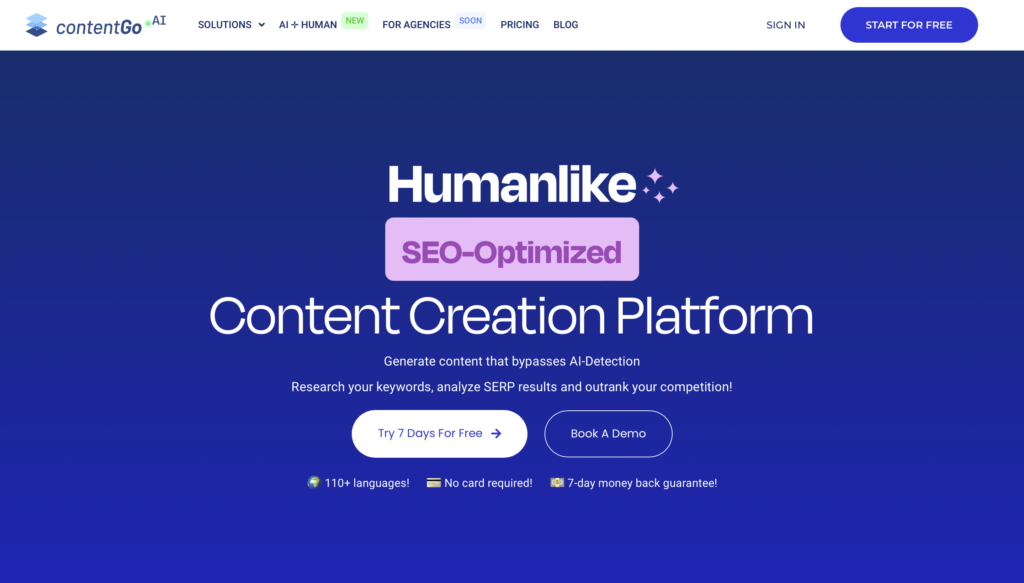
ContentGO AI is a cutting-edge content generation platform that delivers human-like copy quickly, at scale, and consistently. One of its standout features is its extensive experience; as a company with a decade of history, ContentGO AI has accumulated a rich repository of valuable content marketing data, enhancing its ability to produce high-quality content.
A standout feature of ContentGO AI, particularly advantageous for e-commerce businesses and large retailers, is its bulk content creation capability. It integrates seamlessly with major e-commerce platforms such as Shopify, Squarespace, Wix, SquareUp, WooCommerce, and BigCommerce. Regardless of the number of products you have, you can provide a single brief for each and generate product descriptions for all your items in minutes, effortlessly adding the content to your e-commerce website.
In addition to product descriptions, ContentGO AI excels at creating blog posts, blog outlines, social media content, and much more, making it an invaluable tool for comprehensive content generation.
ContentGo AI Pros
- It’s great for e-commerce. It connects with e-commerce platforms like Shopify, Squarespace, Wix, SquareUp, WooCommerce, and BigCommerce.
- Has a bulk content creation mode.
- Provides outputs in 120+ languages.
- Offers a wide gallery of templates covering various use cases.
- Has an SEO-optimized content outline template, specifically for blog posts.
- It has a built-in keyword research tool to help users build strong briefs.
- Has a SERP analysis tool that assists with competition analysis and summarizes top search engine results.
- You can utilize the AI+Human feature to have human editors review your content, ensuring it aligns perfectly with your brief.
ContentGo AI Cons
- While the Power Mode’s response time is somewhat sluggish, the quality of the generated content is excellent, often exceeding the capabilities of AI detection tools.
- ContentGo AI currently lacks a built-in plagiarism checker.
- WordPress integration is not available yet but is expected to be released soon.
- The variety of templates could be expanded to offer more options.
ContentGo AI Pricing
- Light ($32.50/month) for solo creators with 80,000 words,
- Expert ($57.50/month) for small teams with 1,200,000 words,
- Power ($119.17/month) for larger teams with 6,000,000 words and additional features like bulk content creation and unlimited seats.
There is also an Enterprise plan with custom solutions, unlimited words, and dedicated support. All plans include SEO tools, keyword research, SERP analysis, and full integration with eCommerce platforms. A 7-day free trial is available to test the features before committing.
Pixelcut – for perfect product pictures
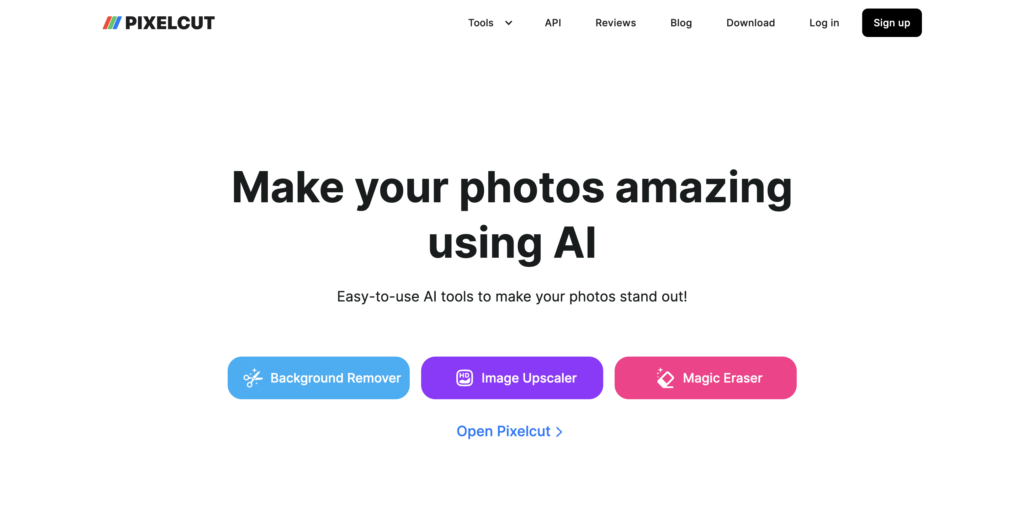
Pixelcut is another great tool that will meet the needs of modern e-commerce businesses by providing powerful, easy-to-use features for creating stunning product images. Its integration capabilities and batch-processing features make it especially useful for large retailers looking to manage and enhance their visual content efficiently.
Beyond product photos, Pixelcut can create promotional materials, social media content, and other visual assets, making it a versatile tool for various marketing needs. Plus, using a tool like this will allow you to standardize the appearance of product images and maintain a consistent look across all your product listings.
PixelCut Pros
- Has a background removal feature.
- Offers a wide range of customizable templates for creating promotional graphics, social media posts, and product listings.
- The batch-processing feature allows multiple images to be edited simultaneously.
- Integrates seamlessly with major e-commerce platforms.
- Has a user-friendly interface.
- Cost-efficient.
PixelCut Cons
- Has limited advanced editing features.
- Customization options may be limited compared to creating designs from scratch.
- Subscription costs may become expensive for small businesses or startups with tight budgets.
- For very specific or high-end requirements, the results might not match those of professional graphic design work done manually.
PixelCut Pricing
- The free plan has limited access to essential tools for basic image editing needs.
- The monthly subscription costs $9.99 and gives full access to Pixelcut Pro features, including unlimited background removal, batch editing, over 100 premium templates, and various fonts, backdrops, and overlays.
- A yearly subscription is $59.99 per year (equivalent to $4.99 per month) and has the same benefits as the monthly subscription but at a 50% discount compared to the monthly rate.
Barilliance – to excel personalization
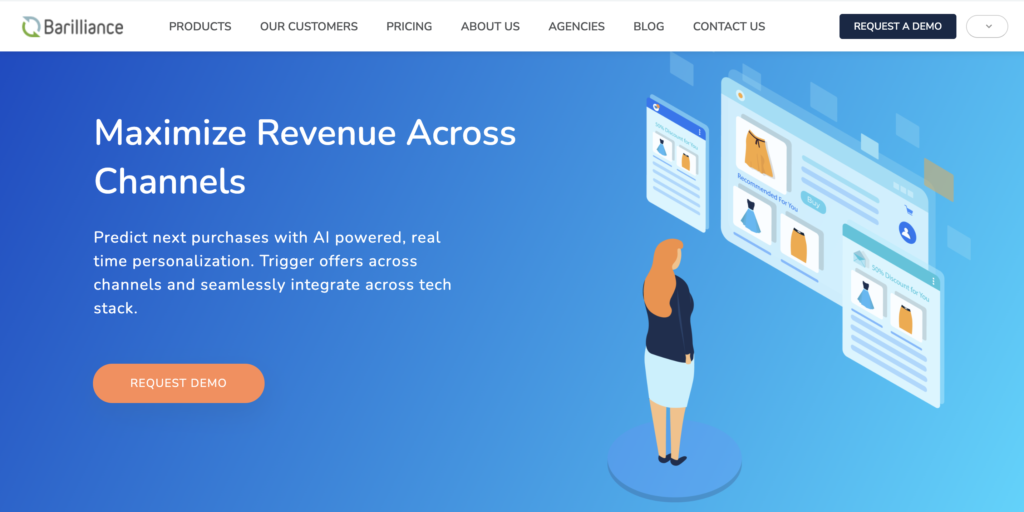
If you are looking for a tool to create targeted marketing campaigns and personalized messages for your customers, Barilliance is a great choice. It specializes in delivering real-time personalization and marketing automation solutions for e-commerce businesses. Offering personalized shopping experiences helps retailers increase conversion rates, boost average order values, and improve customer retention.
Considering most e-commerce businesses leverage this strategy, integrating Barilliance into your marketing toolkit can give you a competitive edge. Its ability to tailor content and recommendations to individual customers ensures a more engaging shopping experience, ultimately driving higher customer satisfaction and loyalty.
Barilliance Pros
- Gives real-time personalized product recommendations and content.
- Boosts conversion rates.
- Improves customer retention.
- Integrates seamlessly with most e-commerce platforms.
Barilliance Cons
- Prices might be costly for small businesses or startups.
- Initial setup time can be time-consuming.
Barilliance Pricing
- Barilliance has a subscription-based pricing model.
- The starting price is $250 monthly as of 2024.
- There is no free version available.
- The pricing does not include a trial period.
- The actual cost may vary depending on the specific features and scale of use required by the business.
Synthesia — for marketing videos
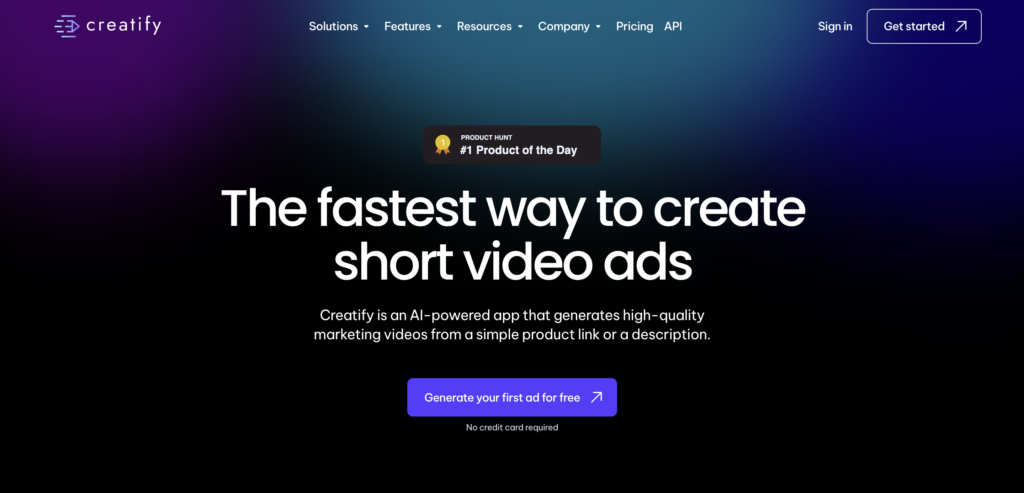
If you want a tool to create engaging product demonstration videos that effectively showcase product features and benefits, Synthesia is the platform for you. The platform supports personalized video messages, enhancing customer engagement through personalized marketing campaigns, greetings, and special offers. Synthesia’s multilingual support also helps businesses reach a global audience, making their content accessible in multiple languages.
Plus, Synthesia’s automated video production significantly reduces the time and cost of traditional video creation methods, allowing businesses to produce high-quality videos quickly and efficiently. This scalability is crucial for growing businesses that must generate a large content volume without escalating costs.
Synthesia Pros
- Allows users to create videos without advanced video editing skills or technical knowledge.
- Provides extensive customization options, including various avatars, languages, and voice options.
- Significantly reduces the time and cost associated with traditional video production.
Synthesia Cons
- It may not provide the same level of creative control as traditional video editing software.
- AI-generated avatars might lack the authenticity and emotional connection of real human presenters.
- The pricing model may be prohibitive for small businesses or startups with limited budgets.
Synthesia Pricing
- The basic plan is $30 per month (billed annually). It includes access to basic features, a limited number of video credits, and standard support.
- The corporate plan has custom pricing based on the business’s needs. It includes advanced features, unlimited video credits, priority support, and additional customization options.
Klevu – to increase conversions
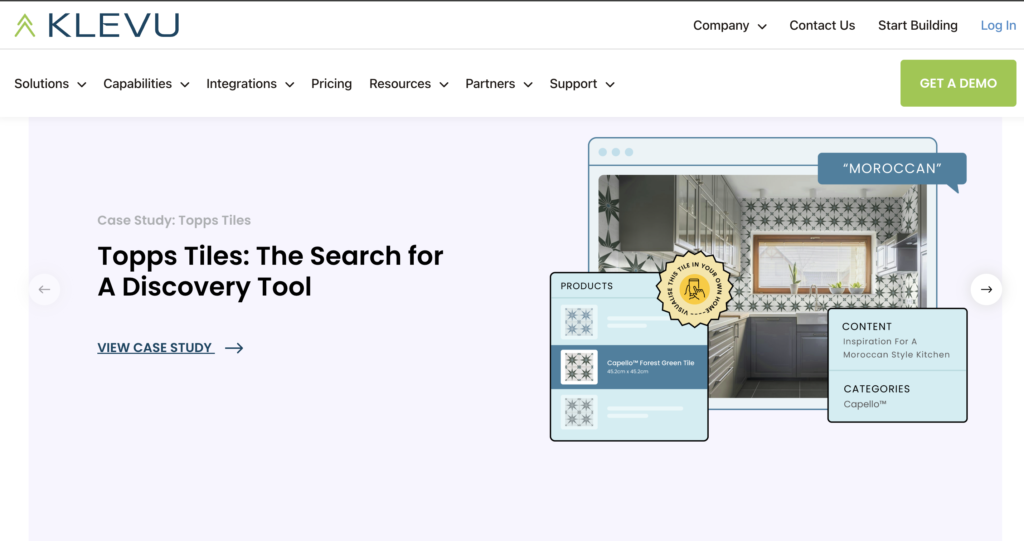
Klevu provides powerful AI-driven search and navigation solutions. While it offers advanced features and seamless integration with major platforms, businesses must consider the associated costs and complexity to ensure it aligns with their needs and capabilities.
What makes Klevu particularly powerful for e-commerce businesses is its ability to leverage advanced AI and machine learning technologies to understand and predict customer intent. This ensures that users receive the most relevant search results, even when their queries are complex or imprecise. Additionally, its personalized search results based on user behavior improve the user experience and increase the likelihood of conversions. The detailed analytics and insights provided by Klevu help businesses continuously refine and optimize their search functionality, ensuring they can adapt to changing customer preferences and maintain a competitive edge in the market.
Klevu Pros
- Delivers highly relevant search results, even when queries are complex or contain typographical errors.
- Personalizes search results based on individual user behavior and preferences.
- Integrates seamlessly with major e-commerce platforms such as Shopify, Magento, and BigCommerce.
- Provides detailed analytics and insights into search behavior and performance.
Klevu Cons
- The advanced features and capabilities come at a premium, which might not be feasible for all businesses.
- The extensive features and customization options can be overwhelming for some users.
Klevu Pricing
Klevu offers a subscription-based pricing model with several tiers to accommodate different business sizes and needs. As of 2024, here are the general pricing details:
- Essential Plan:
Price: Starting at $499 per month.
Features: Basic search capabilities, personalization, and standard support.
- Advanced Plan:
Price: Custom pricing based on specific business needs.
Features: Advanced search and personalization features, enhanced analytics, and premium support.
- Enterprise Plan:
Price: Custom pricing tailored for large-scale businesses.
Features: Comprehensive search solutions, full customization, dedicated account management, and enterprise-level support.
Best 5 Product Description Examples
As we’ve mentioned above, your marketing efforts are crucial to every process of your eCommerce business. This includes attracting potential customers, nurturing existing ones, and encouraging repeat purchases. A key component of your marketing strategy is the product descriptions.
Product descriptions serve as the frontline of your marketing efforts. They provide potential customers with essential information about your products and play a pivotal role in influencing purchasing decisions.
Well-crafted descriptions can highlight your product’s unique features and benefits, answer common customer questions, and create a compelling case for why a customer should choose your product over others.
By prioritizing clear, engaging, and informative product descriptions, you can significantly enhance the overall effectiveness of your marketing strategy.
Here are some of the best examples of product descriptions:
Apple Vision Pro

Apple’s Vision Pro product description exemplifies Apple’s marketing mastery. The description appeals directly to the user’s sensory experiences with the ultra-high-resolution display, advanced sensors, and spatial audio, creating an immersive and emotionally engaging narrative.
Also, it doesn’t involve overly technical jargon, making it accessible yet impressive. Apple’s choice of words—such as”unparalleled visual experience” and “effortless control”—crafts an emotional response that aligns perfectly with its innovative, reliable, and indispensable branding. This description informs and inspires, positioning Vision Pro as an essential tool for anyone looking to explore new realities.
Tesla Cybertruck

Tesla’s description of the Cybertruck is also another great example. It showcases the product’s durability and unique, almost indestructible quality, appealing to consumers’ desires for reliability and toughness.
The detailed performance metrics, like the acceleration from 0 to 60 mph in 2.9 seconds and up to 500 miles of range, highlight the vehicle’s impressive capabilities, making it clear this is not just a truck but a revolutionary shift in automotive technology. Tesla’s narrative effectively positions the Cybertruck as a symbol of innovation and a practical, powerful tool for everyday use, creating a compelling call to action for potential buyers.
Amazon Alexa

Amazon’s product description for Alexa is one of the best examples of blending functionality with lifestyle integration. By emphasizing Alexa’s capabilities—playing music, setting reminders, controlling smart home devices—the description directly appeals to the everyday needs of its target audience.
Using simple, powerful language ensures that the benefits are clear and compelling. Phrases like “your ultimate smart home companion” and “make your life easier” create an emotional connection, making Alexa seem indispensable. The emphasis on far-field voice recognition and integration with thousands of devices further reinforces its versatility and user-friendliness, making the product description informative and engaging.
Volkswagen Golf
By highlighting the “turbocharged engine” and “advanced suspension,” the description of Volkswagen Golf assures potential buyers of the car’s performance and reliability. The narrative then shifts to the interior, emphasizing “high-quality materials” and “intuitive controls,” which appeal to the consumer’s desire for comfort and convenience.
The description’s use of terms like “dynamic driving experience” and “perfect blend of style, performance, and versatility” creates an aspirational tone, aligning the Golf with the lifestyle and goals of its target audience. This blend of practical benefits and emotional appeal makes the description highly effective.
Dyson V15 Detect
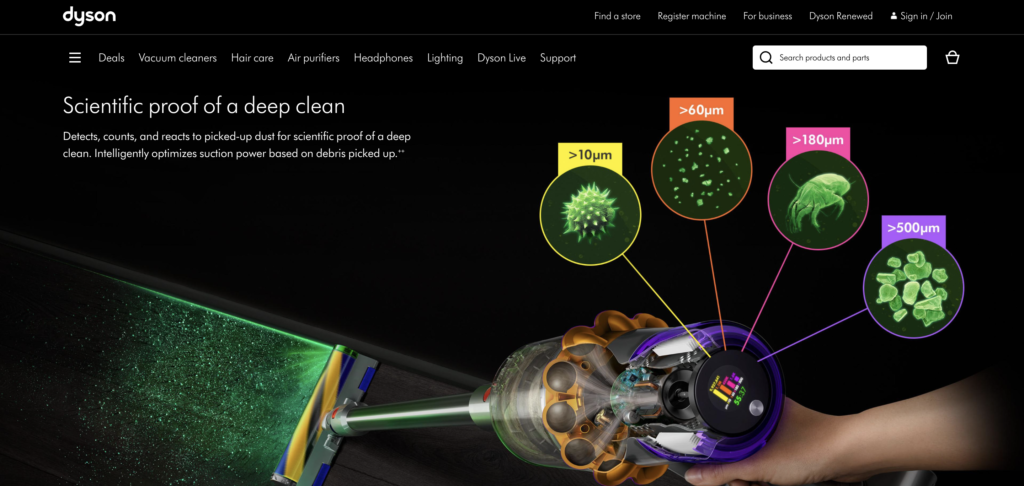
Dyson’s description of the V15 Detect is leveraging its reputation for innovation and quality. The mention of “laser detection technology” and “advanced filtration system” highlights the product’s features, appealing to tech-savvy consumers.
By focusing on real-time performance updates and versatile design, the description emphasizes convenience and ease of use, addressing the practical concerns of potential buyers. Phrases like “unleash the power of clean” and “ultimate tool for a cleaner home” create a strong emotional appeal, positioning the V15 Detect not just as a vacuum cleaner but as an essential ally in maintaining a clean and healthy living environment. This strategic approach ensures that the description is both informative and compelling.
By examining the product descriptions of the worldwide products in the market, you can position yourself as one of the best-looking and most desirable brands in your industry.
Aim to craft product descriptions that highlight the features and advantages of your offerings and resonate deeply with your target audience.
Product Description Template
The free template below provides the essential structure for crafting an effective product description that you can easily adapt and use:
[Product Name]
[Tagline: A brief, catchy phrase summarizing the product]
Introduction:
Introducing [Product Name]: [Tagline]. This [type of product] seamlessly [key function or benefit], offering [unique experience or primary benefit].
Key Features and Benefits:
With its [key feature], [additional key feature], and [another key feature], [Product Name] [primary benefit]. Powered by the [relevant technology or component], it delivers [key benefits such as performance or efficiency].
Usage and Interaction:
The [user-friendly or intuitive aspect], combined with [additional interactive feature], provides [ease of use or other benefit]. Whether you’re [common use case], [another use case], or [another use case], [Product Name] redefines what’s possible.
Performance Metrics and Specifications:
[Include specific performance metrics, technical specifications, or advanced features].
Design and Aesthetics:
The [Product Name] boasts [describe design], ensuring [benefit related to design]. The [specific design feature] provides [benefit related to comfort, usability, or aesthetics].
User Experience and Interaction:
[Describe how the product enhances the user experience, including any unique interaction features].
Versatility and Adaptability:
[Highlight the product’s versatility and ability to adapt to various user needs or environments].
Final Call to Action:
[Strong call to action, encouraging the reader to purchase or learn more about the product].
Factors to Consider When Choosing a Generative AI Tool

Generated with ContentGo AI
Choosing the right generative AI tool can significantly impact your workflow and productivity. Even if it is task-specific, it will change your whole business. Think about it, even if you start with just one task, like content generation or customer support, the improvements can ripple through your entire operation.
The increased efficiency and accuracy in that one area free up time and resources, allowing you to focus on other important aspects of your business. Over time, this will lead to better decision-making, more innovative strategies, and overall growth.
Here are the 3 main areas to consider:
Integration with existing systems
When selecting a generative AI tool, it’s crucial to ensure that it integrates seamlessly with your current systems. This means the tool should work well with your existing software and platforms without causing disruptions.
For instance, if you use specific project management tools, check if the AI tool can connect with them to streamline your processes. Integration is vital because it allows for a smooth transition and ensures all your tools can communicate and work together efficiently.
Customizability and scalability
The second most important thing to consider is customizability. How much you can tailor the AI tool to meet your specific needs? A good generative AI tool should offer options to adjust settings, features, and functionalities to suit your unique requirements.
The tool you choose should be able to grow with your needs. As your business or project expands, it should be able to handle increased workloads and more complex tasks without losing performance. This ensures that the tool remains useful and relevant in the long run.
Ease of use and setup
Lastly, consider how easy the tool is to set up and use. A user-friendly interface and straightforward setup process can save you time and frustration. Look for tools with clear documentation, tutorials, and customer support to help you get started.
The easier the tool, the quicker you can benefit from its capabilities. This is especially important if you’re not tech-savvy or have a team with varying levels of technical expertise.
Level up your content with ContentGo AI
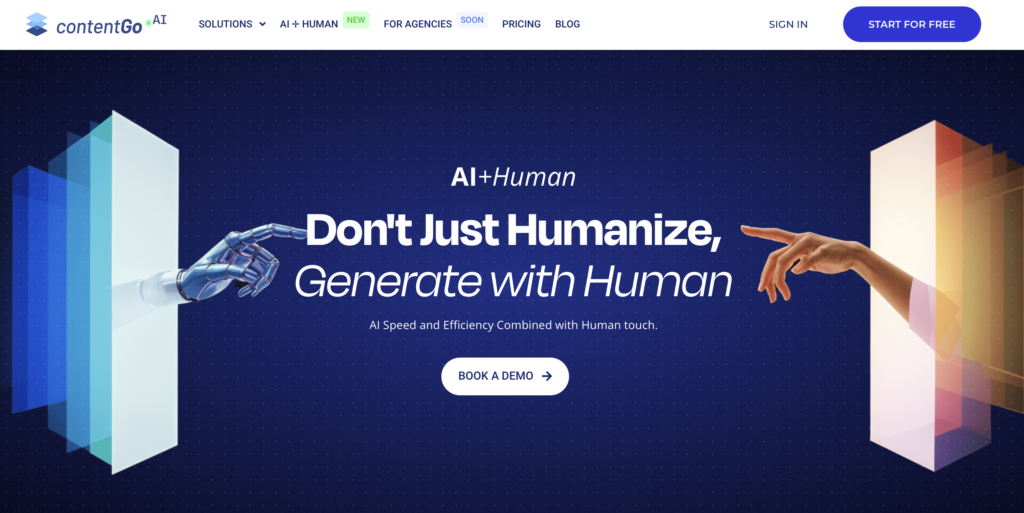
No matter how many resources or time you have, investing in AI technology to manage your business is beneficial. AI tools for eCommerce will free you to focus on strategic growth and innovation.
Remember, your content is the heart of your eCommerce brand. It is the way to tell your brand’s story to your customers.
If you are looking for a tool to streamline your content, ContentGo AI will help you generate high-quality product descriptions, blog posts, and social media content, either in bulk or individually.
Whether you’re a small business owner looking to enhance your online presence or a large enterprise aiming to scale your content production, ContentGo AI is designed to adapt to your requirements.
Sign up today and experience the transformation in your content creation process.
